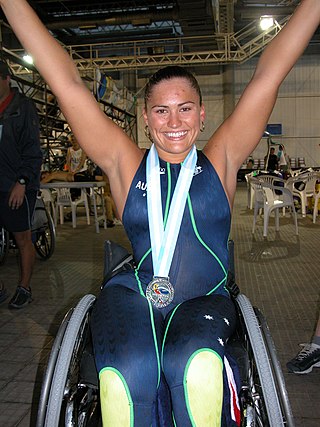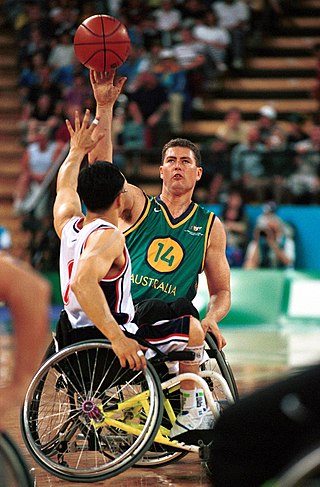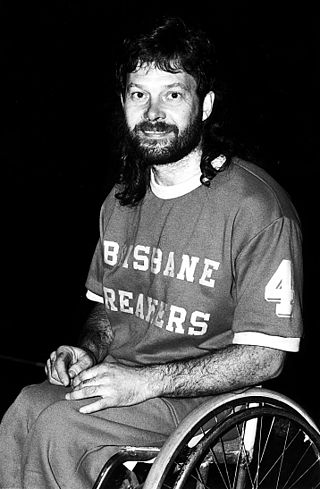Related Research Articles

Marayke Caroline Jonkers is a retired Australian Paralympic swimmer and paratriathlete. She won two bronze medals at the 2004 Athens Paralympics and a silver medal at the 2008 Beijing Paralympics, along with a bronze medal at the 2010 Budapest ITU Triathlon World Championships.
Paralympics Australia (PA) previously called the Australian Paralympic Committee (APC) (1998–2019) is the National Paralympic Committee in Australia for the Paralympic Games movement. It oversees the preparation and management of Australian teams that participate at the Summer Paralympics and the Winter Paralympics.

Kevin Richard Coombs, OAM PLY is an Australian wheelchair basketballer and athlete who competed at 5 Paralympics including the first Paralympic Games in 1960. He was the first Australian Aboriginal Paralympic competitor for Australia.

Adrian John King, OAM is an Australian wheelchair basketball player. He was part of the Australia men's national wheelchair basketball team at the 2000 Sydney, 2004 Athens, and 2008 Beijing Paralympics. He won a silver medal as part of the 2004 team and a gold medal as part of the 2008 team, for which he received a Medal of the Order of Australia. He is currently living in Queensland.

Australia competed at the 1980 Summer Paralympics in Arnhem, Netherlands. It was the 6th Summer Paralympic Games in which Australia had competed. These Games were the biggest Paralympics yet, with 1,973 people participating. Of those participants, 57 were Australian. The team was made up of 45 men and 12 women, and was Australia's largest team to compete at any Paralympic Games so far.

Ryan Scott, is a Paralympic wheelchair rugby competitor from Australia. In four Paralympics, Scott has won a silver medal at the 2008 Beijing Paralympics and gold medals at the 2012 London and 2016 Rio Paralympics.
The Sporting Wheelies and Disabled Association is the peak body for sport, recreation and fitness for people with a physical disability or vision impairment in the Australian state of Queensland.

John Martin is an Australian Paralympic archer, athlete, table tennis player, wheelchair basketballer and wheelchair fencer who won three silver medals at five Paralympics. He was born in England and emigrated to Australia with his family at the age of 13.
Eric Cyril Russell, MBE is an Australian Paralympic athlete, coach, and administrator.
The 2nd FESPIC Games was a multi-sport event for Far East and South Pacific athletes with a disability held in Parramatta, Australia.
Eric Boulter is an Australian swimmer, athlete, and wheelchair basketball player who won two medals at the 1972 Heidelberg Paralympics.

The Commonwealth Paraplegic Games were an international, multi-sport event involving athletes with a disability from the Commonwealth countries. The event was sometimes referred to as the Paraplegic Empire Games and British Commonwealth Paraplegic Games. Athletes were generally those with spinal injuries or polio. The Games were an important milestone in the Paralympic sports movement as they began the decline of the Stoke Mandeville Games' dominating influence. The event was first held in 1962 and disestablished in 1974. The Games were held in the country hosting the Commonwealth Games for able-bodied athletes, a tradition eventually fully adopted by the larger Olympic and Paralympic movements.
Tracey Freeman is an Australian Paralympic athlete who won ten medals at two Paralympics.

Robert Lindon McIntyre nicknamed "Macca", was an Australian Paralympic athlete, wheelchair basketball player and coach.
Kerri-Anne Weston is an Australian swimmer with paraplegia who won five medals at the 1984 New York/Stoke Mandeville Paralympics.

Ramon (Ray) Gary Epstein, is an Australian Paralympic weightlifter and powerlifting coach. He represented Australia in weightlifting at the 1988 Seoul and 1992 Barcelona Paralympics and was Head Coach of the Australian Paralympic powerlifting team between 2003 and 2013.

Raymond Barrett was an Indigenous Australian Paralympic athlete left a paraplegic following a car accident. Prior to this he was a champion juvenile athlete in able-bodied sports. A bronze medalist at the 1972 Summer Paralympics Heidelberg Germany, a high achiever at the Stoke Mandeville Games England, Commonwealth Paraplegic Games, National Paraplegic and Quadriplegic Games, FESPIC Games and State selection trials. A sporting complex in the Sutherland Shire of Sydney is named in his honor. The people of this Shire were his 'significant others'.
John MacDonald Falconar Grant, AO, OBE was an Australian neurosurgeon and disability sport administrator. He was president of the 2000 Sydney Paralympic Games Organising Committee. He played a leading role in the development of disability sport in Australia.

Anthony Eric "Tony" South OAM AM is an Australian Paralympic archer who won a gold medal and two silver medals at the 1968 Summer Paralympics and a bronze medal at the 1972 Summer Paralympics.
Victor Salvemini was an Australian Paralympic athlete from Western Australia. As a wheelchair athlete, he competed in several sports including archery, basketball and track sprinting in the 1970s. A paraplegic, he lost the use of both his legs after a car accident in Fremantle, Western Australia in 1961 when he was 14 years old.
References
- ↑ "Balanced approach to fitness". Sydney Morning Herald. 23 October 2003. Retrieved 10 February 2021.
- ↑ "One of five gold medals won by Fred Nitz". Paralympic Stories. Retrieved 10 February 2021.
- ↑ "F.E.S.P.I.C. Games Disabled athletes' success". The Canberra Times . Vol. 57, no. 17, 211. Australian Capital Territory, Australia. 11 November 1982. p. 28. Retrieved 10 February 2021– via National Library of Australia.
- ↑ Epstein, Vicki (2002). Step by step we conquer : the story of Queensland's Sporting Wheelies and Disabled Association. Southport, Qld: Queensland: Keeaira Press. pp. 131–36.
- ↑ "CQ launches Accessible Cycling Program" (PDF). Blind Sports Australia Newsletter. July 2015: 4.
- ↑ "NHS Round 2 proves no holiday on the Sunshine Coast" (PDF). Para-cycling Update. January 2009: 3. July 2009.
- ↑ "About us". Nitz Hydraulic websire. Retrieved 11 February 2011.
- ↑ "Master Plumber Magazine - May/June 2019 by Master Plumbers' Association of Queensland - Issuu". Master Plumbers Magazine. May / June 2019: 37.
- ↑ "Sporting Wheelies Queensland Hall Of Fame". Sporting Wheelies and Disabled Association. Retrieved 10 February 2021.